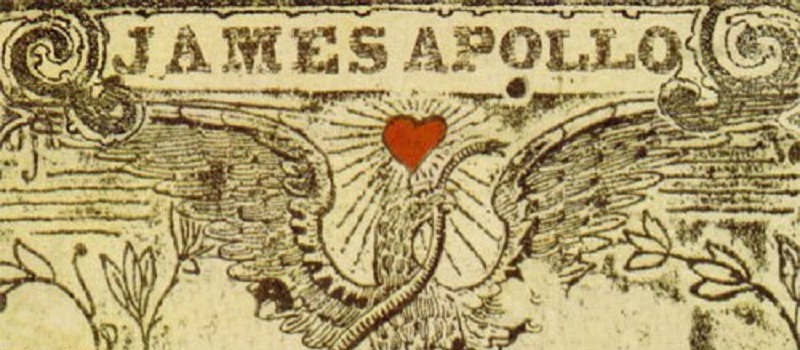You’d expect the singer/songwriter behind a somber yet matter-of-fact title like Good Grief to choose the arched-backed Atlas instead of Apollo as his muse and his namesake. But you’d be wrong. While the Greek god of the arts and/or prophecy is surely a fitting choice for the young James Apollo, there seems to be something even more oddly appropriate about citing as inspiration a man who bears the weight of the heavens on his shoulders, accepting his peculiar fate and welcoming discomfort so leisurely. There’s hardly a moment of discomfort, though, on the 13 tracks Apollo cooks up on Good Grief, a dusty collection of infectious barn-burners, poppy hooks, and rail-car blues served against a backdrop of desert sunsets, midnight skies, and imaginary Western saloons.
After the spare acoustic reminiscence and pump organ moans of “Prelude, Colonel Travis,” the record quickly gets moving with the rough-and-tumble balladry of “The Alamo” and the tango-’til-they’re-sore bar-room bounce of the acoustic “Spring Storm,” both of which set the basic ground rules for much of the excellent, 40-minute record. Apollo borrows freely and frequently from Southwesterners like Calexico and the folksy Victoria Williams, but he’s also a songwriter of a more precise and sometimes less freewheeling order. There’s a welcoming emotional range on Good Grief, to be sure, but it is not matched with the genre-bending experimentation of Burns and Convertino or, moreso, of Howe Gelb and his ever-shifting Giant Sand.
In this sense, Apollo may owe more to modern troubadours like Jeff Buckley, whose seductive and expressive voice he sometimes — if only subtly — suggests. Case in point: “Dead Men Weigh More,” a bluesy closing-time reflection backed by brushed traps and what could be an upright bass, or the “Lilac Wine”-like “Long Rope” or “Loneliness,” or the vaguely Hank Williams-influenced “All The Pretty” (a traditional tune, it seems, that’s also been covered by Calexico and Friends of Dean Martinez). He also may have an unknowing champion in Richard Buckner, whose grossly underrated acoustic guitar and vocal work is frequently rougher around the edges than Apollo’s but who shares an interest in combining folk elements with poetic but catchy (and occasionally poppy) refrains.
Some of the record’s finest tracks, though, may be the ones where Apollo doesn’t wax elegiac but instead really eggs on the full force of drummer/organist/pianist Noah Strom and bassist Nate Lamusga. Take the chart-ready percussion tumbles and catchy choruses of “Libertyville,” the grimy, borderline-campiness of the possible Waits homage “Mercenary Tango,” and the poppy closing title track. All of them hit the mark, and all of them are surprisingly accessible.
But it only seems to get better. The rhythmic, acoustic desert ballad “Three Birds” — complete with a sense of shadowy mystery and a dead-on call-and-response chorus — and the invigorating “Slow Burn” are straight off Calexico’s The Black Light and as good as much of that majestic record. It’s hard to find a dud in the mix.
In a different era, Apollo may have been a traveling bluesman riding the rails as he worked together a repertoire of broken-hearted ruminations, a musician whose work grew richer with each night he slept on the road or each drink he ingested without becoming the late Robert Johnson. In 2005, though, he’s an indie musician with a flair for crafting emotive but understated ballads for an acoustic guitar and a nagging but wonderful sense of longing and loss. And grief clearly becomes him. – Delusions of Adequacy, June 23, 2005




